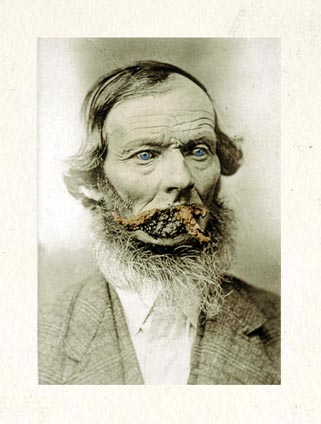
PATIENT OF Dr. Geo. F. French, of Minneapolis, Minn. In medical literature we find many accounts of human horns springing from various portions of the body. These cases create surprise and wonder at first thought, but when we consider the outer layer of the epidermis, together with the nails, is a natural growth of horny character, we become far less surprised by these unnatural horny growths. About three years ago a lesion appeared on the edge of the lower lip, near the angle of the mouth. In three months it had assumed a horny consistency and at the end of a year was one-half an inch in length. About this time two more horns appeared on the opposite side of the lip, and in six months attained the size of the first. Six months later these three horns were cut off close to the lip, but in a year they grew to three of four times their former dimensions. Two months ago, while in the woods, and pushing his way through the brush, the horns were torn apart, and the lacerated wound, which has never healed, discharges, at the present time, a foul, unhealthy pus.

No one there did not know of him,
the blue-eyed man with a mouth of horns.
His lips spittled years into nightmare
and seeded the dreams of children
for decades. They'd see him into middle age
and on, still there, back in a slumbered corner
of sleep, rousing, then moving toward them
mumbling and chewing, or merely waiting,
as if he were some ordinary anybody
crossing their dream's tide.
He could not walk the streets of Minneapolis
without hearing the sound of rodents
and the constant opening of bellows—
the high squeaks of certain women,
the sucked-air-gasps of the startled.
And he wished for strong cheese
and steel traps, for big bellows
to flame the carbon of their fears
and burn their windpipes to the husks
of stops and slow, groaning vowels.
He grew as hard as horn toward his neighbors.
The doctor had explained, explained carefully
to his wife that the springing of human horns,
most often to the head, though rare, was not
unknown, that we all carry horn's potential
and any part might horn: a heel,
a follicle, the genitals of either sex,
that six inches was often seen, that ten
had been recorded.
But science did not stanch her revulsion,
and it discharged like a slow and constant suppuration.
He could smell it—on the furniture, the dinner plates,
the pages of his Bible, and all about her body.
And she, too, like the children, dreamed,
dreamed of crabs climbing out of his mouth,
dreamed them walking their bed at night,
crawling the length of her, under her gown, burrowing
as his mouth would still attempt—his needs and humors,
his sinew and inwards, having not changed.
But her issue rebuked his authority
for he had grown enamored of his horns,
and he felt a sour softening in his bones,
for a wife that maketh her husband ashamed
is as a rottenness in his bones.
A man shall eat good by the fruit of his mouth:
but the soul of the transgressor shall eat violence.
And the fruit of his mouth was horn,
and he would not crawl on all fours to eat dirt
like whimpering Job, who wept that he had sewed sackcloth
upon his skin and defiled his horn in the dust.
For God loved the world and blest man's horn,
for God, too, was horned. And Habakkuk had said,
God's brightness was the light, and He had horns
coming out of His hand and had psalmed
He would bud the horn of David
and exalt it like the horn of an unicorn.
And he read his wife the horned scriptures
and the scriptures of his authority
and the scriptures of pollution,
and grunting and squealing as his horns stirred
and his marrow thickened to sweetness,
and the calluses of his hands
hardened, throbbed, and began to split,
he told her she would banquet
on the violence of his brightness.
And he was upon her,
and she was like corn.
